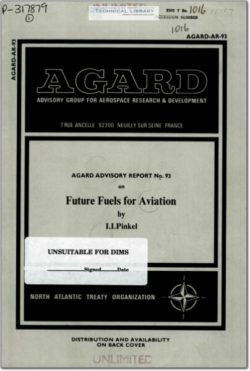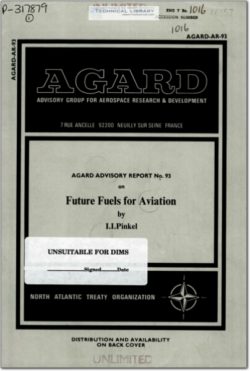AGARD-AR-93

- Version
- 84 Downloads
- 7.12 MB File Size
- 1 File Count
- March 8, 2016 Create Date
- March 8, 2016 Last Updated
Future Fuels for Aviation

This report is a preliminary survey conducted for AGARD on the future fuel outlook for aviation fuels expressed
by various segments of the aviation community of almost all of the NATO countries. The information for this
report was obtained during meetings held under AGARD auspices in the United States, United Kingdom, Norway,
Denmark, the Netherlands, Belgium, France, Germany, Italy and Canada. While an attempt was made to contact all
segments of the aviation community in each of these countries, practical considerations of time, cost, and availability
of key people limited such contact. The meeting list and the affiliation of the attendees, Appendix A, shows the
breadth of representation of the aviation community that was achieved.
A rational treatment of the prospects for aviation fuel must be couched in the total energy outlook. For this
reason, this report discusses the plans the NATO countries have for increasing the fuels derived from all sources
(petroleum, natural gas, coal, tar sands, and shale oil) and the substitutions that are planned to relieve the demand for
petroleum products by shifting some of this demand to other energy sources. Such shifting patterns of use offer
an opportunity to aviation to insure a continuing supply of hydrocarbon fuel at a price it can afford for a greater
number of years than would otherwise be the case. However, the aviation industry may be required to promote
special R&D in the general fuels area and to make accommodations in its own field to exploit this opportunity.
The nature of the research and development to accomplish this is the subject of part of this report. Some of this
R&D is already underway or planned. All of it would benefit from AGARD encouragement.
Estimates of the variation of aviation fuel availability with time are difficult to make in View of the uncertainties
regarding the success of petroleum prospecting and secondary petroleum recovery techniques, and the changing
policies of the oil exporting countries. Likewise, the timing of the development of the syncrude industry for re-
covering hydrocarbon fuels from tar sands, oil shale and coal, is clouded by technical, political, and economic
uncertainties that will be discussed.
| File | Action |
|---|---|
| AGARD-AR-93 Future Fuels for Aviation.pdf | Download |

Comment On This Post